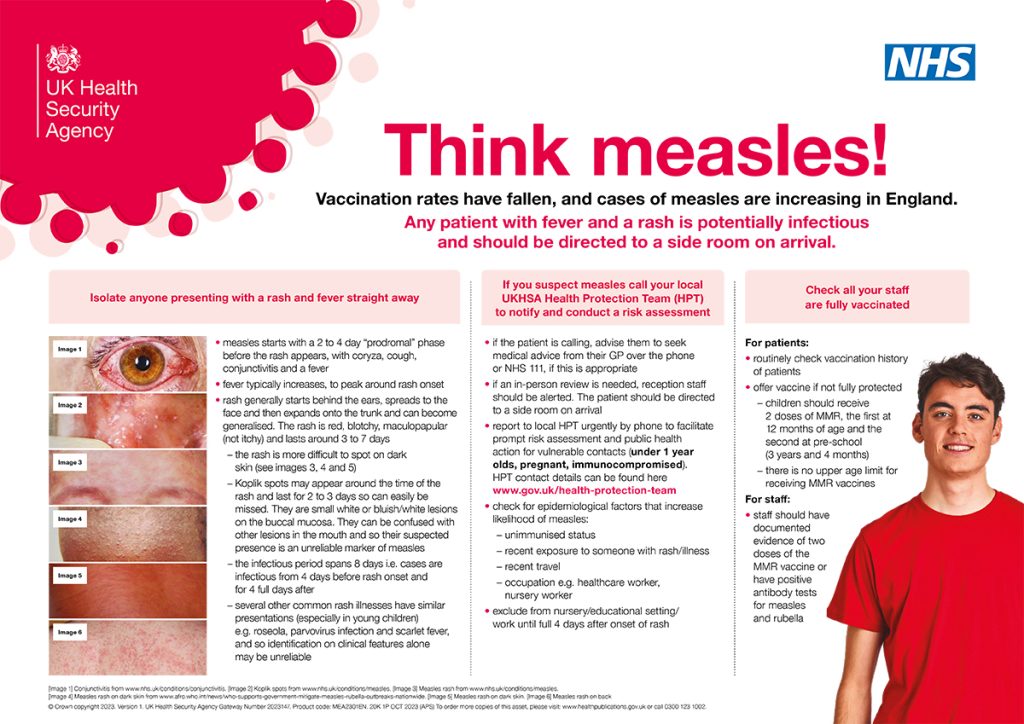Vaccinations
COVID
For information go to www.gov.uk/coronavirus or www.nhs.uk/coronavirus
Other immunisations
Seasonal Influenza Vaccinations
Clinics to be advised later in the year for the 2025 campaign
Shingles
What causes shingles?
Shingles is cause by the reactivation of the chickenpox virus. After people have chickenpox – usually as a child – the virus travels up a nerve root and lies dormant (inactive inside you), near the spine. Later in life the virus can reactivate and cause shingles. Why this happens isn’t completely known, but reaching an older age makes the virus much more likely to reactivate.
Vaccination – who is eligible?
The national shingles immunisation programme is recommend for people age 70 to 79, but is being introduced in phases.
Vaccination is currently being offered to those people who are aged:
70, 71, 72, 73 – 78, 79.
People who are in their seventies but are not yet eligible for vaccination, will be offered vaccination in future years under the national programme.
What about people who are not aged 70 to 79?
People under 70 will be eligible for the shingles vaccine from their seventieth birthday. People aged 80 and over are not part of the national programme because the vaccine seems to be less effective in this age group.
Pneumococcal Vaccination
The pneumococcal vaccine (or ‘pneumo jab’) protects against pneumococcal infections. Infection is caused by the bacterium Streptococcus pneumoniae and can lead to pneumonia, septicaemia (a kind of blood poisoning) and meningitis.
Pneumococcal infections are easily spread by close or prolonged contact with someone who has the infection. The pneumococcal bacteria are present in tiny droplets that are expelled when an infected person breathes, coughs or sneezes. If you breathe in these droplets, you may also be infected.
You can also become infected by touching any droplets that might have landed on a surface such as a table, and then transferring them to your face. Once the bacteria have entered your body – usually through your nose or throat – they can either lie dormant (which means they do not cause you any harm, but they could still be passed onto someone else), or they can multiply and cause health problems such as pneumonia.
Who should have the pneumococcal vaccine?
A pneumococcal infection can affect anyone but some people are at higher risk of serious illness and are therefore eligible for NHS pneumococcal vaccination. These include:
- babies
- adults aged 65 or over
- children and adults with certain long-term health conditions, such as a serious heart or kidney condition
Pneumococcal infections, at their worst, can cause permanent severe brain damage, or even kill. They tend to be most serious in children, older people and people with certain long-term health conditions. It’s a simple and safe vaccine that can prevent pneumococcal infections.
How often is the pneumococcal vaccine given?
Babies receive the pneumococcal vaccine as three separate injections, at 2 months, 4 months and 12-13 months.
People over 65 years of age only need a single pneumococcal vaccination, which will protect for life. It is not given annually like the flu jab. Please contact the surgery to make an appointment.
People with a long-term health condition may need just a single one-off pneumococcal vaccination or five-yearly vaccination depending on their underlying health problem.
Click here for the Complete Immunisation Schedule, (Adults, Children & Infants)

